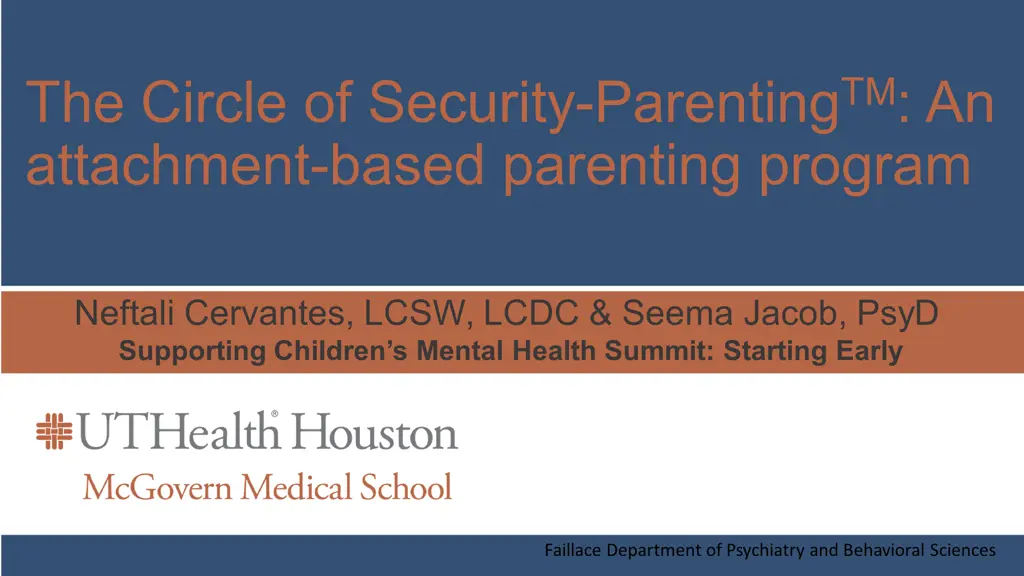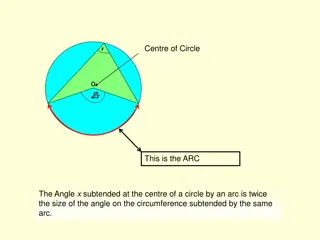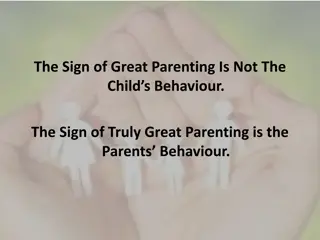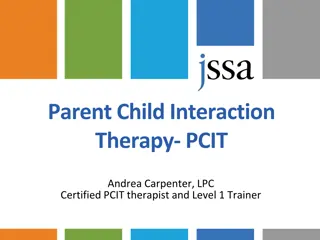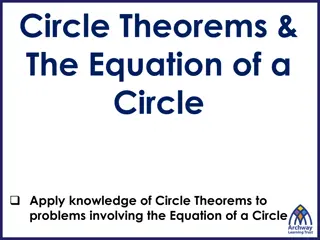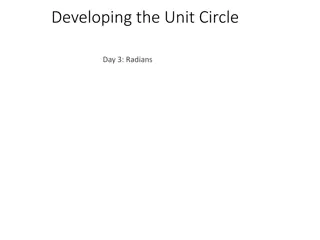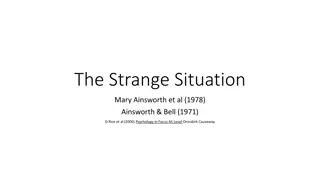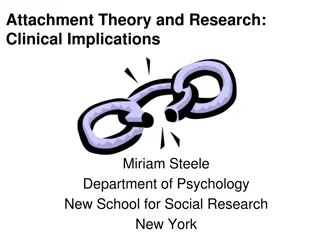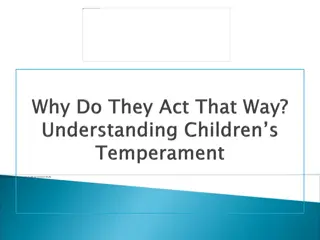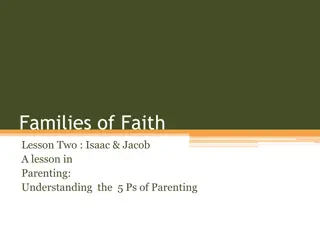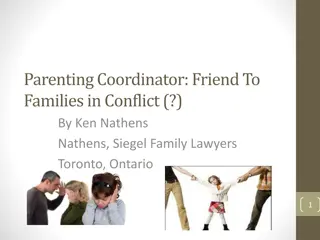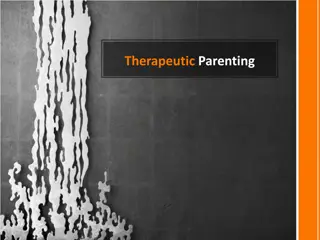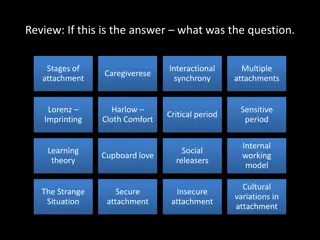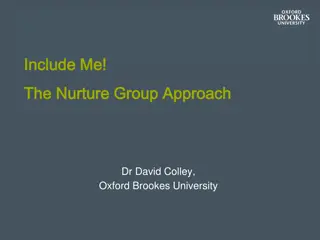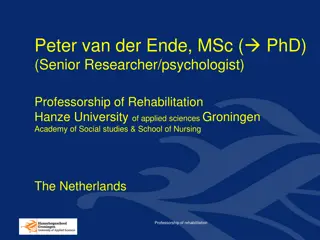Circle of Security-Parenting: Enhancing Attachment for Child Development
The Circle of Security-Parenting program, an attachment-based intervention that supports children's mental health. Discover the benefits of secure attachment and understand the different types of insecure attachment. Find out how the program helps caregivers meet their child's attachment needs and reflect on their own parenting experiences. Available in multiple languages and offered for free in Fort Bend County.
- Circle of Security-Parenting
- attachment-based parenting
- child development
- secure attachment
- insecure attachment
- caregiver support
- mental health
- Fort Bend County
Download Presentation

Please find below an Image/Link to download the presentation.
The content on the website is provided AS IS for your information and personal use only. It may not be sold, licensed, or shared on other websites without obtaining consent from the author. Download presentation by click this link. If you encounter any issues during the download, it is possible that the publisher has removed the file from their server.
E N D
Presentation Transcript
The Circle of Security-ParentingTM: An attachment-based parenting program Neftali Cervantes, LCSW, LCDC & Seema Jacob, PsyD Supporting Children s Mental Health Summit: Starting Early Faillace Department of Psychiatry and Behavioral Sciences
BACKGROUND Based in theory of attachment Care-seeking system Caregiving system Secure attachment improves child development! Faillace Department of Psychiatry and Behavioral Sciences
SECURE ATTACHMENT What do you see the child do? Children are relieved and pleased to see their caregiver return The child shows that he/she expects to be comforted when they are in distressed Easily soothed when upset Infants who were generally content Willing to explore with their caregivers What do you see caregivers do? Provide adequate support & Respond appropriately (often enough) to the attachment needs Help the child regulate his/her emotions Faillace Department of Psychiatry and Behavioral Sciences
Children who have secure attachment relationships: Enjoy more happiness with their parents Feel less anger at their parents Get along better with friends Have stronger friendships Are able to solve problems with friends. Have better relationships with brothers and sisters Have higher self-esteem Know that most problems will have an answer Trust that good things will come their way Trust the people they love Know how to be kind to those around them (Lyons-Ruth et al.,1998) Faillace Department of Psychiatry and Behavioral Sciences
INSECURE ATTACHMENT Avoidant Attachment When children do not turn to their caregivers as a safe haven A caregiver who is uncomfortable with providing comfort as a safe heaven one who communicates that the child should not have the feelings associated with needing safety and closeness. Anxious Resistant Attachment Child fears that exploration will make his caregiver unavailable When a caregiver is uncomfortable with separation and so responds negatively to the child s desire to explore Disorganized Attachment Children seek and fear the caregiver at the same time. When the parents is both the source of fear and comfort for the child. Precursors of Disorganized Attachment (Based on van IJzendoorn et al.,1999): Maltreatment of the child (Abuse, Neglect) Substance Abuse by the parent Frightening behavior by the parent Parent s unresolved loss or trauma Faillace Department of Psychiatry and Behavioral Sciences
WHAT IS CIRCLE OF SECURITY? Created by Bert Powell, Glen Cooper, and Kent Hoffman Circle of Security-Intensive Intervention Group-based format 20 sessions Assessment phase Individualized videos 10 day training and exam Circle of Security-Parenting Group-based format 8 chapter videos and discussion-based series 14 Languages 4 day training Faillace Department of Psychiatry and Behavioral Sciences
WHAT IS CIRCLE OF SECURITY? Parenting intervention focused on developing and bolstering attachment relationships Help caregivers see and respond to child's attachment needs Secure Base Safe Haven Help caregivers understand needs that are difficult for them to meet due to their own internal experiences Help caregivers reflect on their own experiences of being parented to understand their patterns of discomfort Parents miss kids cues but only need 30% of the time to be "good enough Faillace Department of Psychiatry and Behavioral Sciences
Circle of Security Parenting Program in Fort Bend County Offered for free through UTHealth Houston s Nurturing Resilience Initiative 10-week groups English and Spanish Referrals from: BakerRipley EHS/HS programs in Fort Bend Infant Toddler Court Team Local primary care providers Faillace Department of Psychiatry and Behavioral Sciences
QUESTIONS? Faillace Department of Psychiatry and Behavioral Sciences
REFERENCES Circle of Security International. (n.d.). Retrieved September 28, 2021, from https://www.circleofsecurityinternational.com/ Cook, A., Bragg, J., & Reay, R. E. (2021). Pivot to Telehealth: Narrative Reflections on Circle of Security Parenting Groups during COVID 19. Australian and New Zealand Journal of Family Therapy, 42(1), 106-114. Lyons-Ruth, K (2007). The interface between attachment and intersubjectivity: Perspective from the longitudinal study of disorganized attachment. Psychoanalytic Inquiry: A topical Journal for Menthol Health Professional, 26 (4), 595-616. Powell B., Cooper G., Hoffman, & Marvin B. (2014). The Circle of Security Intervention: enhancing attachment in early parent- child relationships. The Guilford Press. Van IJzendoorn, M. Schuengel, C., & Bakermans-Kranenburg, M. (1999). Disorganized attachment in early childhood: Meta- analysis of Precursors, concomitants, and sequelae. Development and Psychopathology, 11 225-249. Yaholkoski, A., Hurl, K., & Theule, J. (2016) Efficacy of the Circle of Security Intervention: A Meta-analysis. Journal of Infant, Child and Adolescent Psychotherapy, 15, 95-103. Zeanah, C. H. (Eds.). (2019) Handbook of Infant Mental Health (4 edition). The Guilford Press. Faillace Department of Psychiatry and Behavioral Sciences
